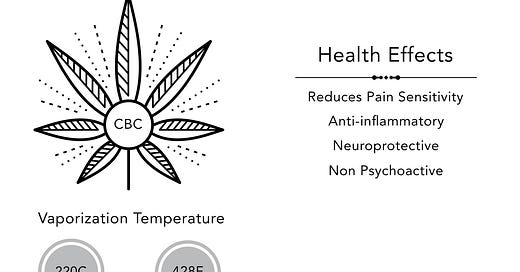Cannabichromene (CBC) is one of the many cannabinoids found in the cannabis plant, often overshadowed by its more famous counterparts, Delta-9-Tetrahydrocannabinol (THC) and Cannabidiol (CBD). Despite its lower profile, CBC is emerging as a significant compound when it comes to medical cannabis, demonstrating a range of therapeutic benefits that warrant closer attention from both researchers and consumers.
CBC was first discovered in the 1960s and, like THC and CBD, it originates from the precursor cannabinoid cannabigerolic acid (CBGA). Through enzymatic reactions, CBGA is converted into cannabichromenic acid (CBCA), which decarboxylates into CBC upon exposure to heat or light.
Unlike THC, CBC does not produce psychoactive effects, as it does not bind well to CB1 receptors in the brain. Instead, CBC primarily interacts with the Endocannabinoid System (ECS) via CB2 receptors, which are more abundant in peripheral organs and the immune system.
A study published in December of 2023 in a special edition of Therapeutic Potential for Cannabis and Cannabinoids 2.0 investigated the antinociceptive (the action or process of blocking the detection of a painful or injurious stimulus by sensory neurons) properties of CBC in male and female mice. The results show that CBC effectively reduces pain throughout many pain assays in both male and female mice, revealing CBC as a potential therapeutic option for treating thermal pain and other diverse types of pain (neuropathic and inflammatory pain). Although more studies are needed, CBC could potentially serve as an alternative to opioid-based painkillers, which carry a high risk of addiction and overdose.

One of CBC's most well-documented benefits is its anti-inflammatory properties. Inflammation is a core component of many chronic diseases, including arthritis, Crohn's disease, and other autoimmune disorders. CBC's ability to interact with CB2 receptors in the ECS, which are heavily involved in the immune response, allows it to modulate inflammatory processes effectively. A study published in November of 2023 in Antioxidant and Anti-inflammatory Activities of Plant Extracts and Phytochemicals looked at the efficacy of CBC in reducing inflammation. The study concluded that CBC treatment significantly reduced inflammation by blocking the production of certain proteins at both the gene and protein levels. It also reduces cell inflammation by interfering with specific pathways involved in inflammation. This makes CBC a promising candidate for managing inflammation without the adverse effects associated with long-term use of nonsteroidal anti-inflammatory drugs (NSAIDs) or corticosteroids.

CBC has shown potential in promoting neurogenesis, the process of forming new neurons and protecting neural health. In a study published in Neurochemistry International in 2013, a team of scientists set out to prove whether or not CBC had any effect on the fate of adult neural stem progenitor cells (NSPCs). (The neural stem/progenitor cell (NSPC) population in the adult brain is essential for brain plasticity under normal physiological conditions as well as during the recovery from brain injuries.) Their results suggest that CBC raises the viability of NSPCs by stimulating brain cell growth and protecting against oxidative stress and inflammation meaning it could potentially be used one day as a treatment for neurodegenerative diseases such as Alzheimer's and Parkinson's disease.
If you’re looking for medicinal cultivars on the Australian market that are high in CBC**…
Heyday’s Flow CBD Flower (Total CBC 3%)
Heyday’s Curated Suver Haze Premium Flower (Total CBC 2%)
Maali’s Cloud CBD 20% (Total CBC 0.2%)
If you’re looking for other products on the Australian medicinal market that are high in CBC**…
NectarTek’s SPECTRUM 100 Oil (Total CBC 10.069mg/ml)
MediGrowth Australia’s Haiiku Nights Dreamcatcher Cartridge (Total CBC 8.14mg/unit)
MediGrowth Australia’s Haiiku Days Lemon Haze Cartridge (Total CBC 6.24mg/unit)
Maali’s Vibe CBG Oil (Total CBC 3.07mg/ml)
Phytoca’s CBD FS70 Oil (Total CBC 3mg/ml)
Phytoca’s CBD FS Capsules (Total CBC 1.3mg/capsule)
MediGrowth Australia’s Balanced Oil (Total CBC 0.8mg/ml)
Medical Cannabis Australia’s MCA CIRRUS T800 Cartridge (Total CBC 0.693mg/unit)
MediGrowth Australia’s THC 50 Oil (Total CBC 0.4mg/ml)
**This data was provided by Catalyst by honahlee. The honahlee team requires all product suppliers to verify their cannabinoid percentages beyond the suppliers’ brochure or health professional marketing claims via a Certificate of Analysis (COA) with measured cannabinoid value for the products to be searchable.
This substack aims to provide anecdotal information from my personal experiences in hopes it will lead to meaningful conversations between my readers and their healthcare professionals about medicinal cannabis.
I have no formal training in medicine or science. This article does not constitute medical advice.





Another tick for they heyday CBD flow flower I have 💚
Wow, what an interesting cannabinoid. I learned a lot from that. It never ceases to amaze me what the humble cannabis plant has to offer us in health and well-being.